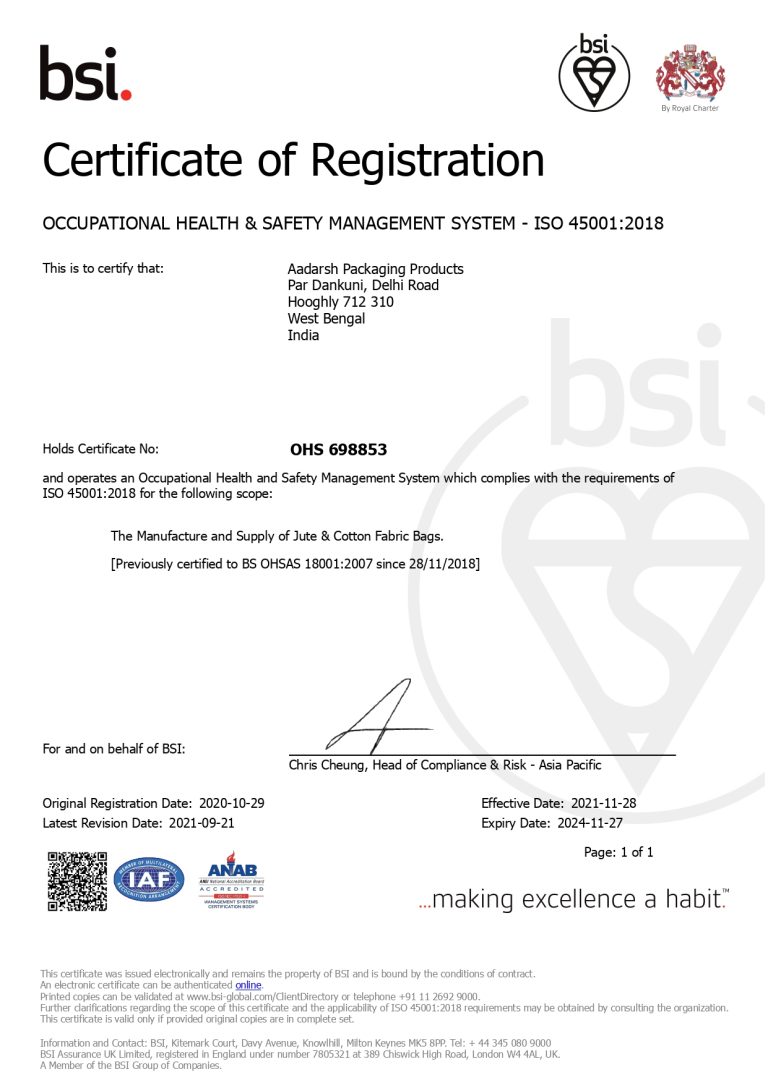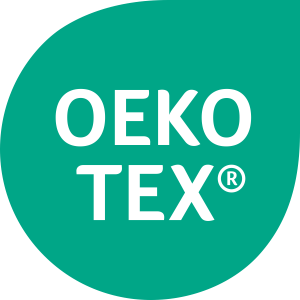
Fairtrade certification ensures fair trade practices for commodities like coffee, cocoa, tea, bananas, and cotton, administered by Fairtrade International and its affiliates globally. Opting for Fairtrade cotton bags not only reflects consumer consciousness but also benefits cotton farmers, the environment, and global sustainability:
- Ethical Production: Fairtrade ensures cotton farmers receive fair pay and work under equitable conditions, supporting their livelihoods and safety.
- Environmental Sustainability: Fairtrade standards promote eco-friendly farming practices, reducing water usage and pesticide use, thus lessening cotton production’s environmental impact.
- Social Impact: Purchasing Fairtrade cotton bags aids social development in cotton-producing regions through investments in education, healthcare, and infrastructure, enhancing farmers’ lives.
- Quality and Durability: Fairtrade cotton bags are durable and reusable, reducing reliance on single-use plastics and contributing to waste reduction efforts.
- Supporting Fairtrade Principles: Choosing Fairtrade products upholds fair wages, empowers small-scale farmers, and advocates for sustainable development, fostering a more equitable and sustainable global economy.

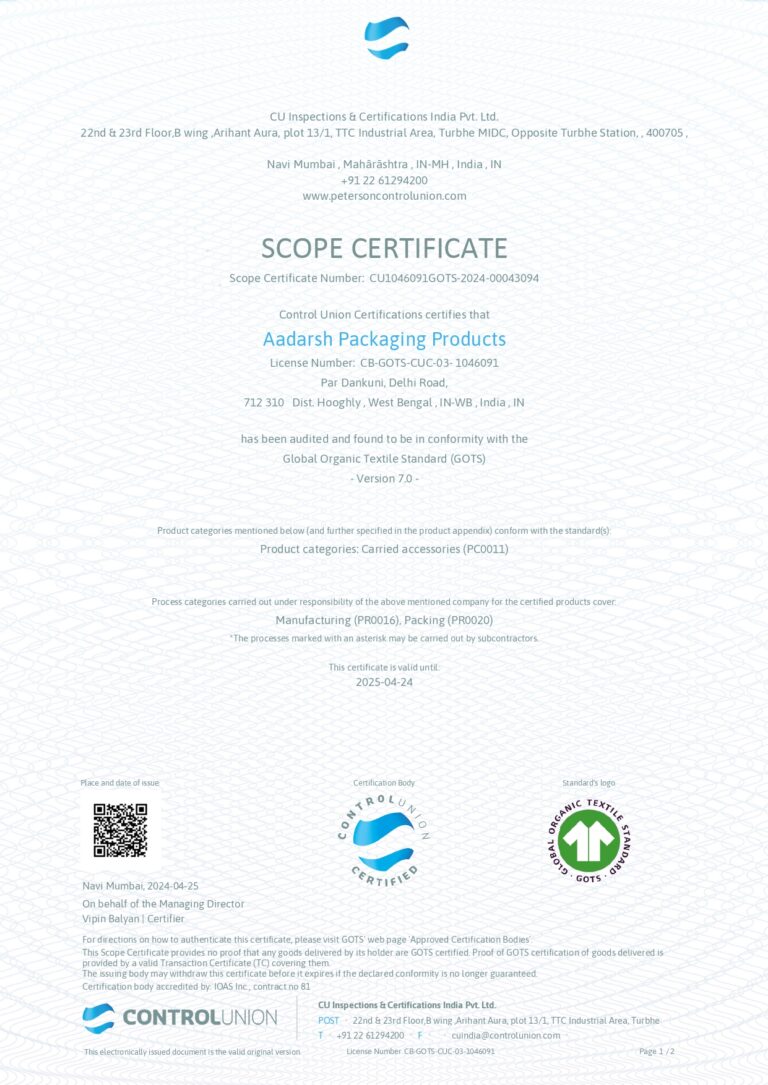
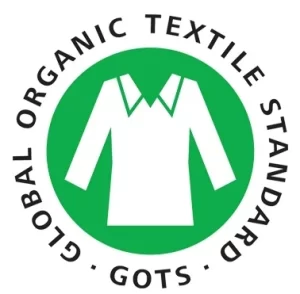
The Global Organic Textile Standard (GOTS) is the premier global standard for processing organic fibers, emphasizing ecological and social criteria. It mandates rigorous guidelines across the textile supply chain, from raw material harvesting to sustainable manufacturing, labeling, and distribution.
GOTS organic bags offer a sustainable, ethical alternative to conventional options, aligning with consumers’ values and fostering a healthier environment and society:
- Environmental Friendliness: Crafted from organic fibers grown without synthetic pesticides or GMOs, GOTS organic bags promote agricultural sustainability, safeguard soil health, and preserve biodiversity.
- Non-Toxic: GOTS prohibits harmful chemicals, ensuring bags are free from toxic residues, thus safe for both consumers and workers.
- Social Responsibility: GOTS certification ensures fair wages, safe working conditions, and bans child labor and discrimination throughout the supply chain.
- Quality Assurance: Stringent quality standards guarantee durable, high-quality bags from raw materials to final production.
- Transparency: Traceability enables consumers to verify organic and ethical production standards, fostering trust in the supply chain.
- Supporting Sustainable Agriculture: Choosing GOTS organic bags supports practices like water conservation, biodiversity, and carbon sequestration, mitigating climate change.
OEKO-TEX Standard 100, a globally esteemed certification for textiles, prioritizes human health by ensuring products are devoid of harmful substances. Certified cotton bags signify a dedication to safety, quality, and environmental consciousness, aiding manufacturers in distinguishing their offerings and assuring consumers of safe choices.
- Safety Guarantee: Certification ensures cotton bags are free from hazardous substances, instilling confidence in their safety for skin contact.
- Skin-Friendly: Rigorous testing confirms bags’ suitability for all skin types, devoid of heavy metals and allergenic dyes, promoting gentle contact.
- Environmental Responsibility: While emphasizing human health, the standard encourages eco-friendly manufacturing, reducing environmental impact and chemical usage.
- Global Trust: Recognized internationally, the certification assures consumers worldwide of products meeting stringent safety standards.
- Transparency and Reliability: Independent testing by accredited laboratories fosters transparency, enhancing trust between manufacturers and consumers, facilitating informed purchasing decisions.
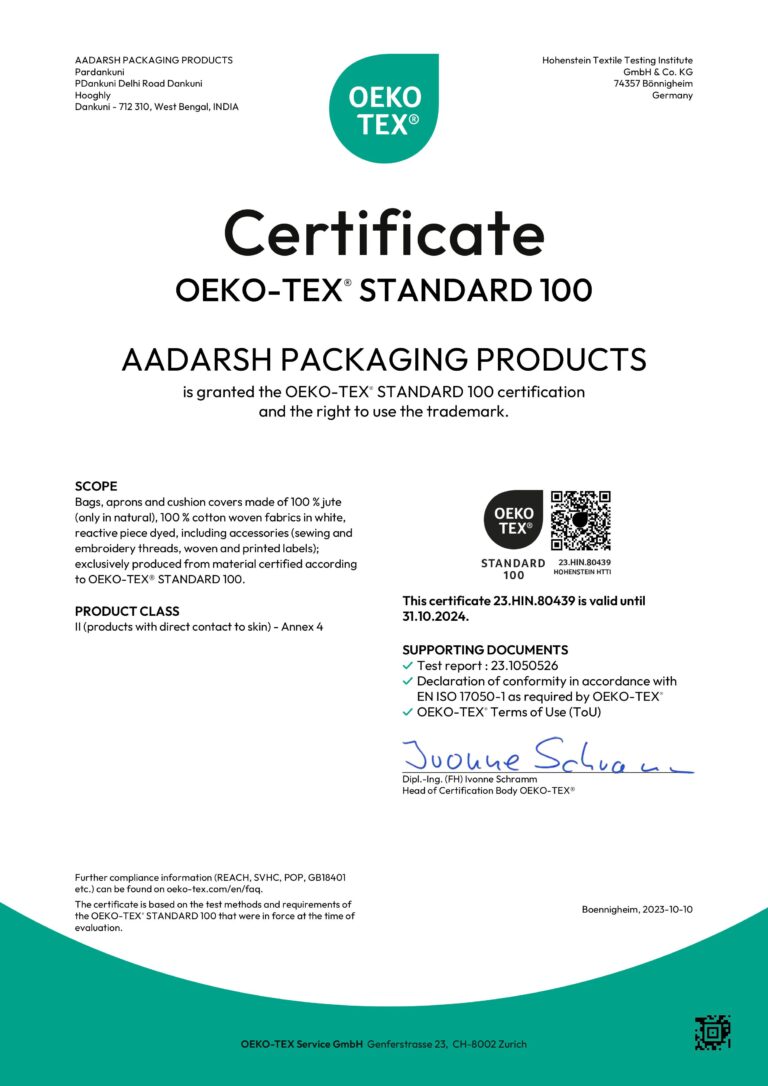
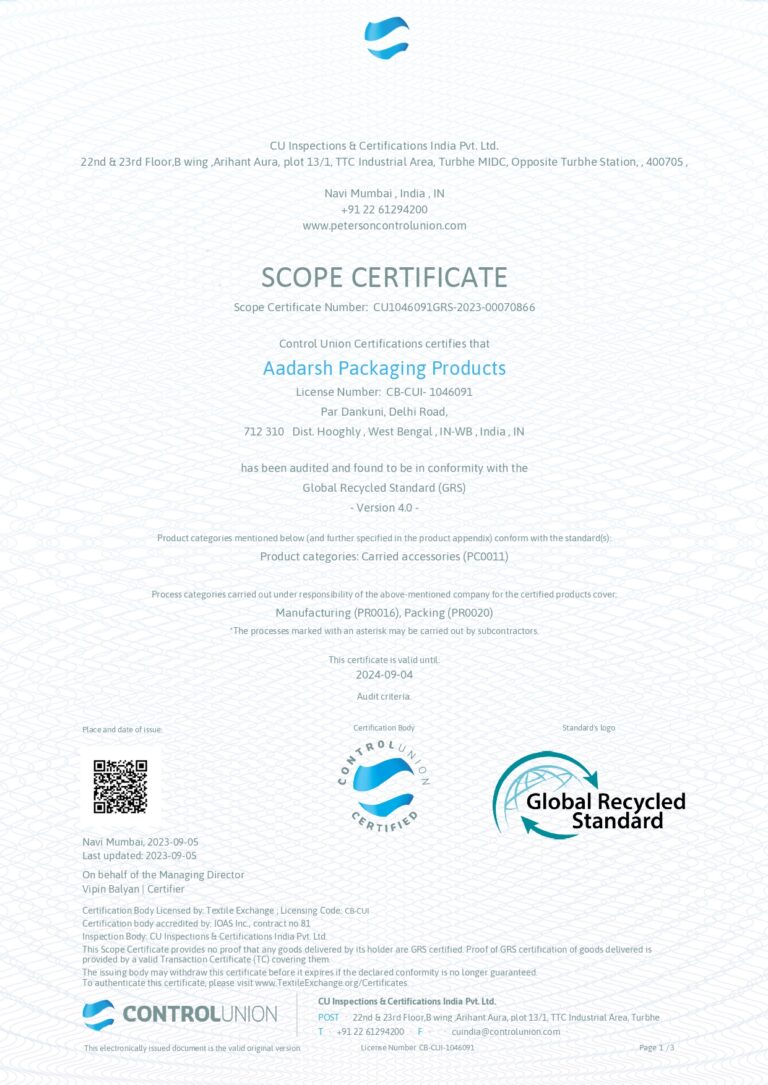

The Global Recycled Standard (GRS) is a voluntary international standard governing recycled content certification, aiming to boost recycled material usage, foster responsible production, and lend credibility to recycled products.
GRS-certified recycled cotton bags offer an eco-friendly, socially conscious alternative to conventional ones, promoting waste reduction, resource conservation, and sustainable consumption:
- Resource Conservation: By utilizing recycled cotton, these bags diminish the demand for new cotton cultivation, conserving water, land, and energy resources.
- Waste Reduction: Repurposing discarded cotton materials, GRS bags divert textile waste from landfills, prolonging textile lifespan and fostering a circular economy.
- Energy Efficiency: Recycling cotton consumes less energy than producing virgin cotton, mitigating greenhouse gas emissions and supporting climate change mitigation.
- Water Preservation: By reducing reliance on irrigated cotton farming, recycled cotton bags alleviate water-intensive practices, promoting sustainable water management.
- Circular Economy Promotion: GRS bags exemplify circular economy principles, advocating for resource reuse and regeneration, thereby advancing sustainability.
- Social Responsibility: GRS-certified manufacturers often uphold ethical labour standards, ensuring fair and safe working conditions, thus supporting social well-being in recycling communities.
The Organic Content Standard (OCS) verifies organic material in products like textiles, ensuring integrity from harvesting to labeling. OCS-certified cotton bags offer a sustainable alternative. They support organic farming, environmental conservation, and ethical textile practices.
• Organic Cotton: OCS-certified bags are made from organically grown cotton, free from synthetic pesticides, fertilizers, or GMOs, promoting sustainability and biodiversity.
• Certification Process: Cotton must meet OCS standards, verified by third parties, ensuring compliance with organic farming and processing criteria.
• Traceability: OCS ensures traceability throughout the supply chain, maintaining organic status from source to manufacturing.
• Environmental Benefits: Organic cotton reduces chemical use, promotes soil fertility, biodiversity, and conserves water and energy.
• Social Responsibility: OCS may include social criteria, ensuring fair wages, safe working conditions, and prohibiting child labor and discrimination.
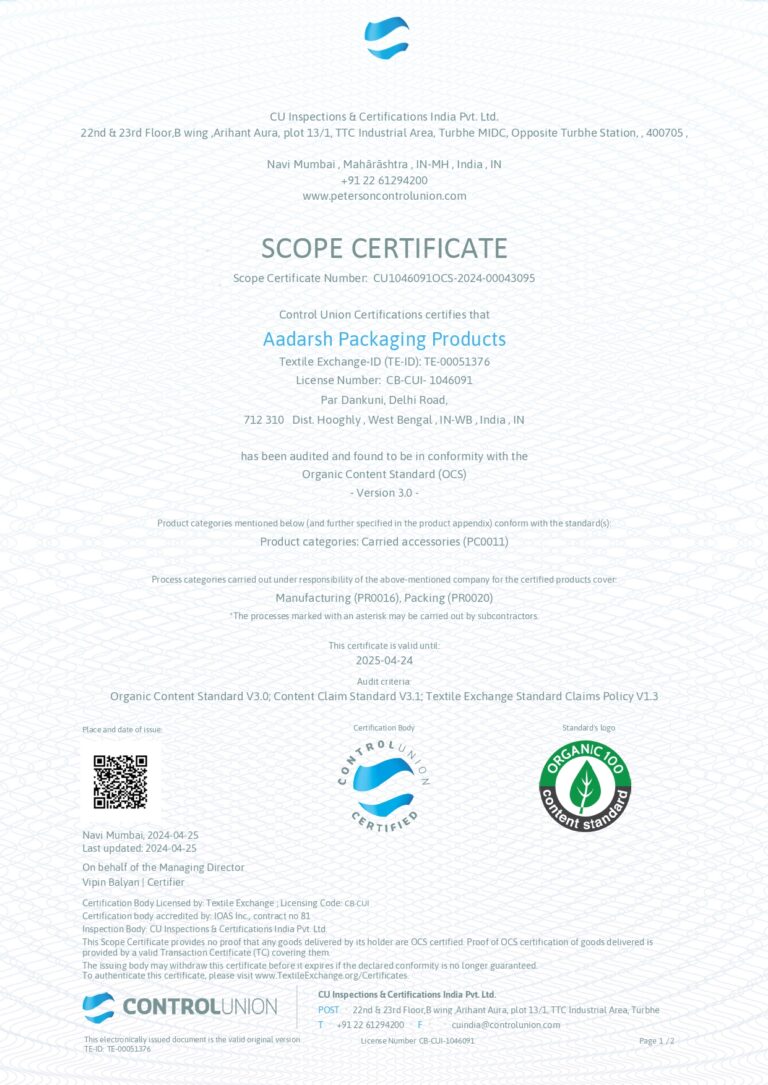
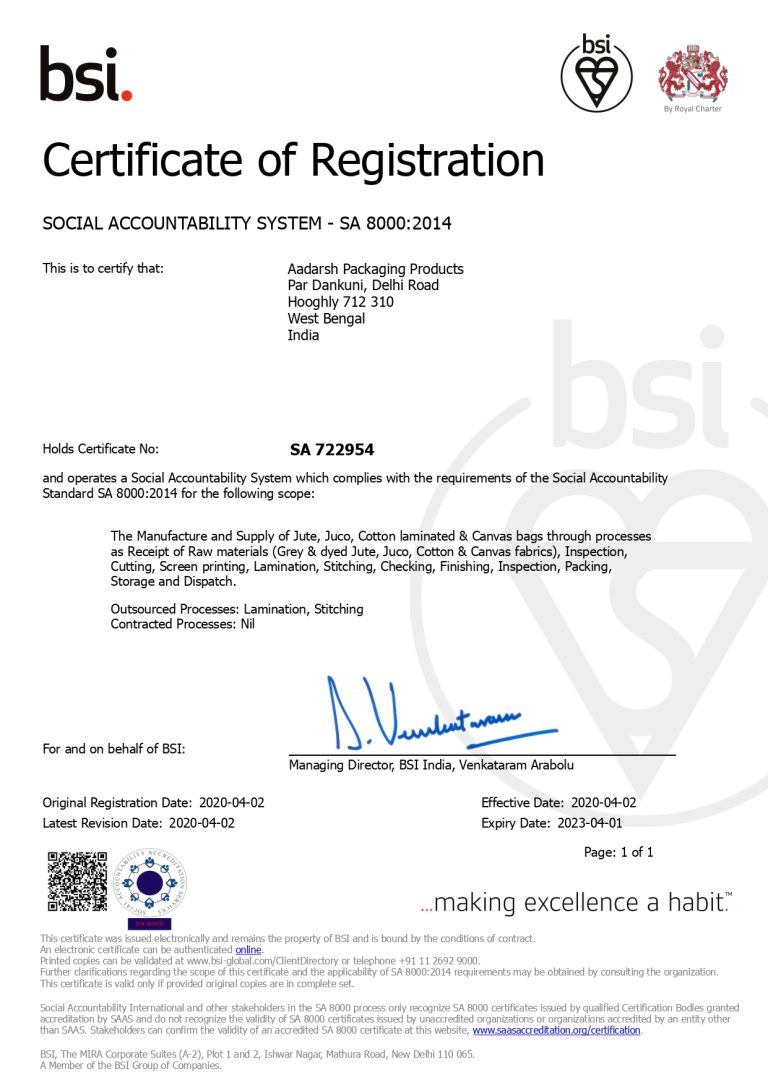

The SA8000 standard, developed by Social Accountability International (SAI), focuses on ensuring decent working conditions, workers’ rights, and social responsibility within organizations. • Labour Rights: Emphasizing freedom of association, prohibiting child and forced labor, and ensuring fair remuneration, in compliance with local and international labor laws. • Health and Safety: Mandating a safe workplace, accident prevention, and access to medical care for employees. • Working Hours: Setting limits on working hours to prevent excessive overtime and maintain work-life balance. • Compensation: Mandating fair wages meeting basic needs, transparent wage practices. • Management Systems: Requiring effective systems for compliance, audits, and employee training. • Supply Chain Responsibility: Extending social responsibility to supply chains, addressing social compliance risks, and promoting ethical sourcing. Certification Process: Organizations undergo a thorough third-party audit to achieve SA8000 certification, assessing compliance with its standards.

ISO 9001 is an international standard by the International Organisation for Standardisation (ISO) that outlines requirements for organisations to establish, implement, maintain, and improve quality management systems (QMS). Key principles include customer focus, ensuring customer satisfaction by meeting their needs and expectations; a process approach, managing and improving organisational processes for efficiency; leadership commitment, where top management drives quality initiatives; engagement of people, empowering employees for quality objectives; continual process improvement through data-driven decisions; and fostering strong supplier relationships for quality throughout the supply chain. ISO 9001 promotes a culture of quality, emphasising continual improvement, evidence-based decision making, and collaborative supplier partnerships.
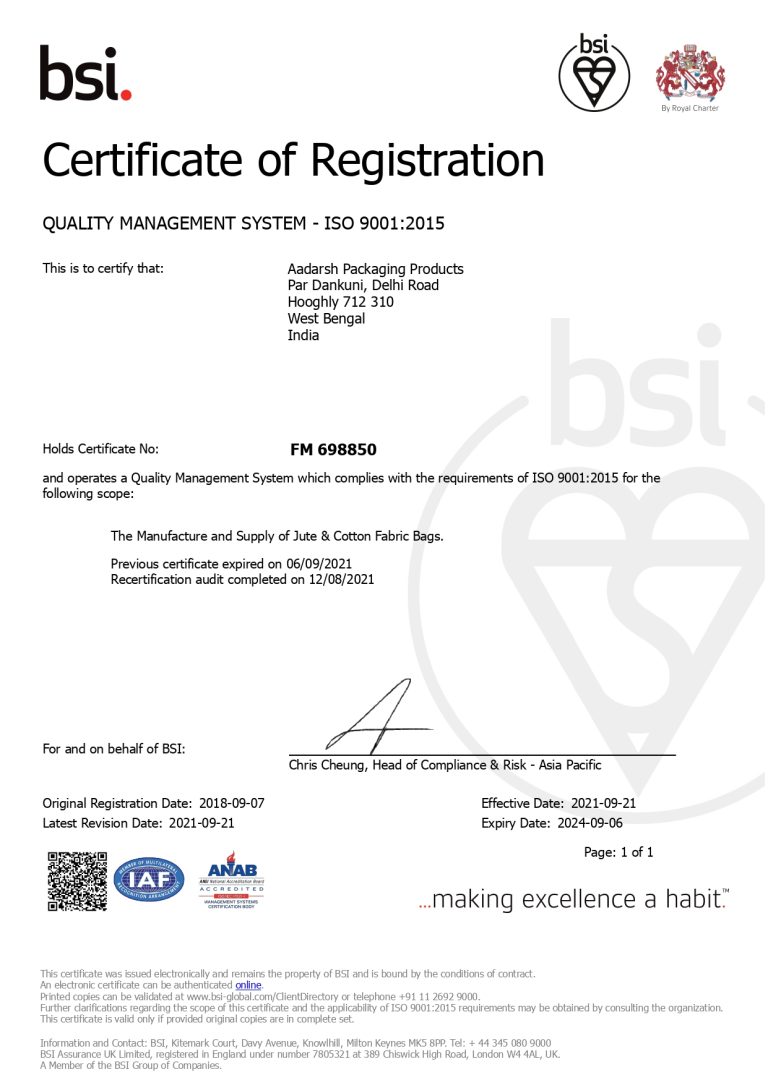
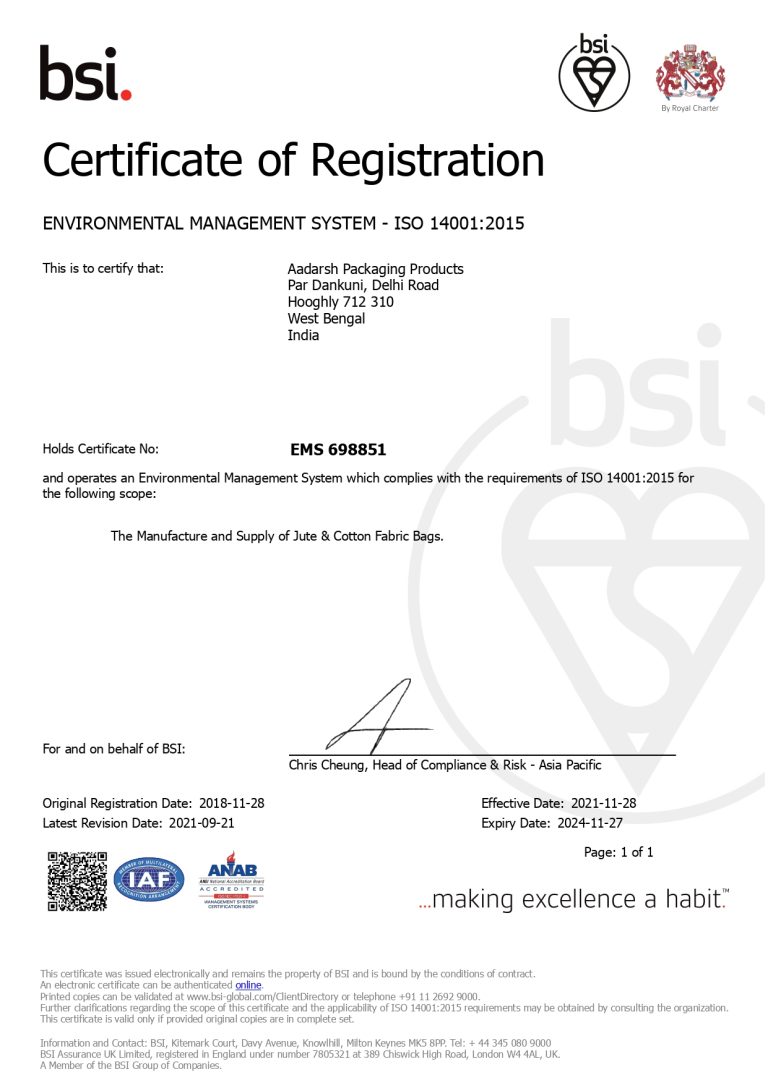

ISO 14001, developed by the International Organisation for Standardisation (ISO), outlines requirements for environmental management systems (EMS) worldwide. It guides organisations in establishing, implementing, maintaining, and improving their environmental practices. Key components include establishing an environmental policy reflecting commitment to compliance and continual improvement; ensuring adherence to environmental laws and regulations; identifying and evaluating environmental impacts like emissions and waste generation; setting measurable environmental objectives aligned with strategic goals; implementing operational controls to manage risks and prevent pollution; preparing for emergencies and responding effectively; monitoring and measuring environmental performance; and fostering communication and engagement with stakeholders. ISO 14001 promotes a proactive approach to environmental stewardship, helping organisations to minimize their environmental footprint while enhancing overall sustainability efforts.

ISO 45001, developed by the International Organisation for Standardisation (ISO), outlines requirements for occupational health and safety management systems (OHSMS). It guides organisations in establishing, implementing, maintaining, and improving their systems to enhance workplace safety.
Key aspects include systematic hazard identification, risk assessment, and control measures to prevent injuries and illnesses; compliance with legal and other occupational health and safety requirements; leadership commitment and worker participation in OHSMS development; setting measurable objectives for improving safety performance; establishing emergency procedures and response plans; fostering effective communication and consultation on safety matters; and ensuring worker competence through appropriate training and resources. ISO 45001 promotes a proactive approach to occupational health and safety, aiming to create safe workplaces and prevent incidents through continual improvement and stakeholder engagement.
